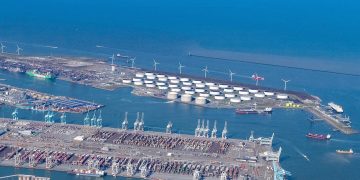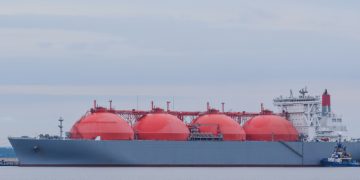In an exclusive interview to SAFETY4SEA, Jill Jarnsäter and Cajsa Jersler Fransson introduce the REDO initiative, which encompasses several projects aimed at transforming onboard culture to foster a better social work environment for all seafarers.
The REDO initiative is dedicated to combating bullying and harassment, and it has developed a unique research platform emphasizing that psychological safety is the cornerstone of a healthy onboard work environment. Inspired by the #metoo movement and launched in Sweden, REDO champions diversity, inclusion, and psychological safety, with ambitions to extend its collaborations with industry stakeholders globally.
SAFETY4SEA: Tell us a few words about the REDO initiative. How did the #metoo movement influence the creation and focus of this project?
The #metoo movement was definitely the trigger that sparked our focus on social sustainability, presenting an issue too significant to ignore. We were fortunate to have strong support from various organizations. Initially, Sweship, the Swedish Shipowners’ Association, and WISTA Sweden backed the #metoo movement for Swedish seafarers with the campaign #anchorsaweigh, creating a platform for others to join. This platform, Fair Winds, includes master mariners universities, governmental bodies, the union, shipowners’ associations, WISTA, and #anchorsaweigh. From this foundation, we then developed a family of projects called REDO.
S4S: What are the top priorities on your agenda for the next five years?
Changing the onboard culture one person at a time involves getting shipping companies to recognize that the social work environment is just as crucial as the physical one. Just as we conduct fire drills, we need to implement exercises on how to be a supportive colleague. These things take practice!
S4S: How do you envision your approach contributing to a safer and more supportive work environment for seafarers?
We operate under the motto “We are each other’s work environment,” emphasizing that we all impact and affect one another with actions, language, but also when we do nothing! Our goal is to teach and support those who feel uneasy and remain silent to speak up. We want to support positive behavior and protect those who struggle, fostering a culture where everyone understands their influence on their colleagues. basically – letting good people claim their space and protect the ones that have a harder time.
S4S: What are some of the key challenges you faced in implementing this initiative across different shipping companies?
To ensure they continue the good work after we leave the ship. We really wish for them to keep having conversations and discussions on how to treat one another, and making it part of the everyday work.
S4S: What barriers exist with regards to the social climate onboard, and how can we turn these into opportunities? What improvements in the work environment on-board are being targeted by this initiative?
The biggest challenge is people’s strong desire to fit in, which often leads them to accept cultures they disagree with. It’s normal, it’s basic human behavior – we want to be part of the pack! But we still have outdated perceptions of what it means to be a sailor—views that no longer apply. And this becomes problematic. We aim to challenge these norms and reshape the culture. By addressing and changing these outdated norms, we can foster a new, inclusive shipping industry. Our preventive approach focuses on building a resilient and inclusive culture that welcomes and supports all sailors.
S4S: Can you share examples of how an inclusive work environment has positively impacted crew retention and overall safety on-board?
One really interesting aspect of our work is learning that women onboard have often struggled to reach their positions and, as a result, sometimes expect other women to endure similar hardships to become tougher. Conversations with these women have been enlightening, and we are excited to see the impact of our efforts. A good story from one of our visits on a ship, we discussed the importance of understanding norms and being an ally. Initially skeptical, one man suddenly sighed and exclaimed, “It is a damn responsibility to be human.” We were so thrilled about his transformation being so profound that we turned his quote into a sticker. Additionally, cadets have expressed their appreciation for us simply existing and of our efforts to improve the work environment.
S4S: Why is the concept of psychological safety important for safety at sea? What actions do you plan to take in response?
Psychological safety is the foundation of a healthy work environment, essential in two key aspects:
- Mental Health of Sailors: Feeling safe to share emotions is vital, especially during long periods away from home. It’s also crucial for sailors to feel secure being alone with other crew members. Lack of psychological safety can lead to poor mental health and, in some cases, leaving work, or even worse, suicide.
- Safety at Sea: It’s important for crew members to feel confident speaking up about issues or irregularities without fear of losing their jobs. This includes reporting missing items, misconduct by higher-ranking officers, or inadequate safety measures, all of which are vital for the safety of the ship.
Also, training officers in leadership where psychological safety is the foundation and inclusion is a tool for fostering a positive onboard culture is a key component of the REDO concept.
S4S: What are some key findings from your research that you believe are crucial for addressing harassment? Can you share any success stories or examples of positive outcomes?
We believe in preventive measures. While we cannot always stop perpetrators, we can all become active bystanders who dare to speak up or support those being harassed. It is really important that the shipping companies set a zero-harassment policy and then ensure proper follow up actions. We have learned that the link between harassment and social norms is the most important lesson. We use a method called the “triangle of violence,” which clearly illustrates the connection between norms, harmful jokes, name-calling, victimization, harassment, bullying, and even assault. Initially, we thought psychological safety and inclusion were just parts of the solution, like two pieces of the puzzle, but we’ve learned that psychological safety IS the puzzle, the very foundation of the entire equation.
S4S: What is your wish list for the industry, regulators, and all parties involved to implement changes and improvements with regards to life onboard / crew welfare?
Oh, there are so many things, but in our field, it would include:
- Implement regulations against all forms of harassment.
- Integrate active bystander training into the Basic Safety Training course for all crew members.
- Require all officers to complete and regularly update a leadership course focused on psychological safety.
- Incorporate mental health into the health training.
- Include social work environment exercises as part of the SMS.
- Recognize that social sustainability is integral to overall sustainability and treat it as such. Establish plans and goals for social sustainability, just as we do for environmental sustainability.
- Shipping companies, be vulnerable and brave in your approach. Communicate directly and dare to work with improving the social work environment both onboard and ashore.
S4S: If you could change one thing from your perspective, what would it be and why?
Stop referring to shipping as a traditional man’s world and recognize the many good people working in it. Trust that we all want to do good; we just need the right tools.
S4S: What future plans do you have for the REDO project to further enhance safety and inclusivity on-board?
We’re nearing completion of our methodology development and have recently launched an “Academy” to provide training in these methods. Currently, this initiative is limited to Swedish vessels. But our future goal is to adapt our methods for various cultures and expand our collaborations to include shipping companies beyond Sweden.
S4S: What is your key message to industry stakeholders looking to implement similar initiatives to promote inclusivity and safety in their workplaces?
Be patient. This is not an overnight miracle but a process of continuous improvement. We have come so far with the physical work environment, and now it’s time to apply that same dedication to enhancing the social aspects of our workplace. Be brave. Dare to dive deep! While challenging at first, opening the can of worms, the potential benefits far outweigh the initial discomfort. There is so much to gain from doing the work.
The views presented are only those of the author and do not necessarily reflect those of SAFETY4SEA and are for information sharing and discussion purposes only.



























































